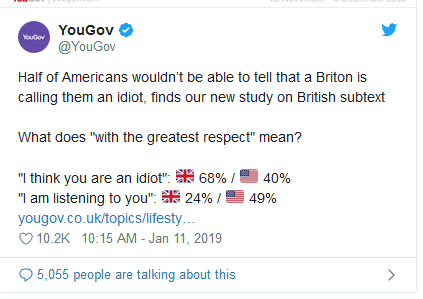Frasi inglesi con opposti significati nel Regno Unito ed in America.
Giuseppe Sandro Mela.
2019-03-08.

«Britons like to think they have a “special relationship” with the US, based on a common language and cultural, historical and political ties»
*
«But, according to one of the UK’s most respected polling companies, there’s one chasm the English language can’t always bridge – the British love of passive-aggressive statements»
*
«half of Americans wouldn’t be able to tell that a Briton is calling them an idiot»
* * * * * * *
I linguaggi sono strumenti evoluti di comunicazione del pensiero.
In un recente studio sarebbe stato appurato che un inglese madrelingua colto abbia un vocabolario che possa variare dai 20,000 ai 30,000 termini. Tuttavia, l’Oxford English Dictionary riporta commentate 171,476 parole differenti. A ciò si aggiunga che spesso lo stesso identico termine assume significati differenti a seconda del contesto in cui è usato. Per esempio, il termine “sergente” in caserma indica un sottufficiale, ma nei lavori manuali denomina una ganascia metallica che mantiene collabiti due diversi elementi. Non a caso sono disponibili per ogni lingua dei dizionari specifici: ingegneristici, medici, architettonici, etc.
*
Ma le parole possono essere anche usate secondo altre finalità, una delle quali è l’umorismo.
In questo i Britons sono maestri al punto tale che è comune fraseggio riferirsi loro con le parole “spiritello sassone”.
Detto franco, l’umorismo inglese è spesso urente sarcasmo.
Lo studio proposto da YouGov mette in luce un aspetto sconcertante: molte frasi britanniche sono intese in modo diametralmente opposto da quanti non siano nati e vissuti nell’isola. Lo studio è stato fatto sottoponendo un elenco di frasi a dei britons di origine controllata ed a degli americani, registrando quindi come esse erano state intese.
Per esempio,
«with the greatest respect»
è una frase untuosamente rispettosa per dire all’interlocutore che è un vero e proprio imbecille.
«Quite good»
Disapprovo. In modo assoluto e totale.
* * * * * * *
Gli inglesi, gli isolani per intenderci, hanno modi formalmente e cortesemente garbati per dire a qualcuno che è un perfetto imbecille.
«It has been said that Britain and America are two nations separated by a common language …. The survey is based on a humorous meme showing how foreigners don’t understand the subtext of British English»
Morale: gli americani sono ‘stranieri’.
Britons like to think they have a “special relationship” with the US, based on a common language and cultural, historical and political ties.
But, according to one of the UK’s most respected polling companies, there’s one chasm the English language can’t always bridge – the British love of passive-aggressive statements.
In the words of YouGov, “half of Americans wouldn’t be able to tell that a Briton is calling them an idiot”.
YouGov showed a number of common British phrases, including “with the greatest respect”, “I’ll bear it in mind” and “you must come for dinner”, to Britons and Americans.
“While not all the phrases show a difference in transatlantic understanding, there are some statements where many Yanks are in danger of missing the serious passive aggression we Brits employ,” YouGov said.
The starkest difference was in the phrase “with the greatest respect” – which most Britons took to mean “I think you are an idiot”, but nearly half of Americans interpreted as “I am listening to you”.
YouGov based its survey on a popular meme of British phrases and their subtext.
YouGov decided to show the same phrases, and each of the meanings, to about 1,700 Brits and 1,900 Americans, and asked them which matched their own interpretation the most closely.
The survey showed that some – though not all – of the stereotypes in the table were statistically correct.
There was plenty of common ground – for example, a majority of both British and US adults consider “I was a bit disappointed that” a polite way of saying “I am annoyed that” – rather than “it doesn’t really matter”.
But those in the UK are much more likely to consider “I’ll bear it in mind” and “I hear what you say” to be attempts to brush you off.
And a higher proportion of Britons than Americans (44% to 31%) think “that is a very brave proposal” actually means “you are insane”.
Plenty of Americans working in the UK have complained about British passive-aggressiveness, or their annoying tendency to beat around the bush.
But UK expats have also complained about American insults directed at Brits.

Nessun commento:
Posta un commento